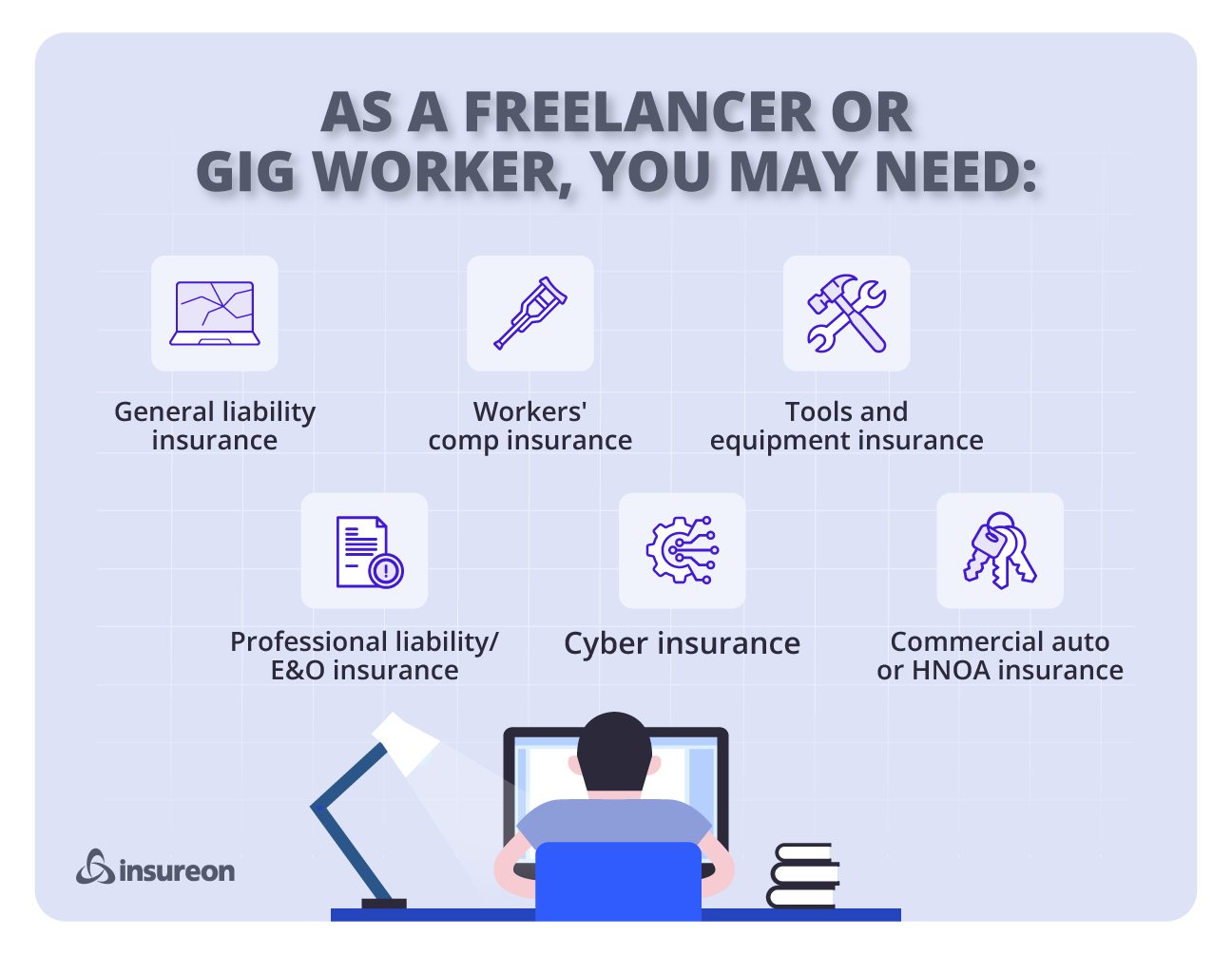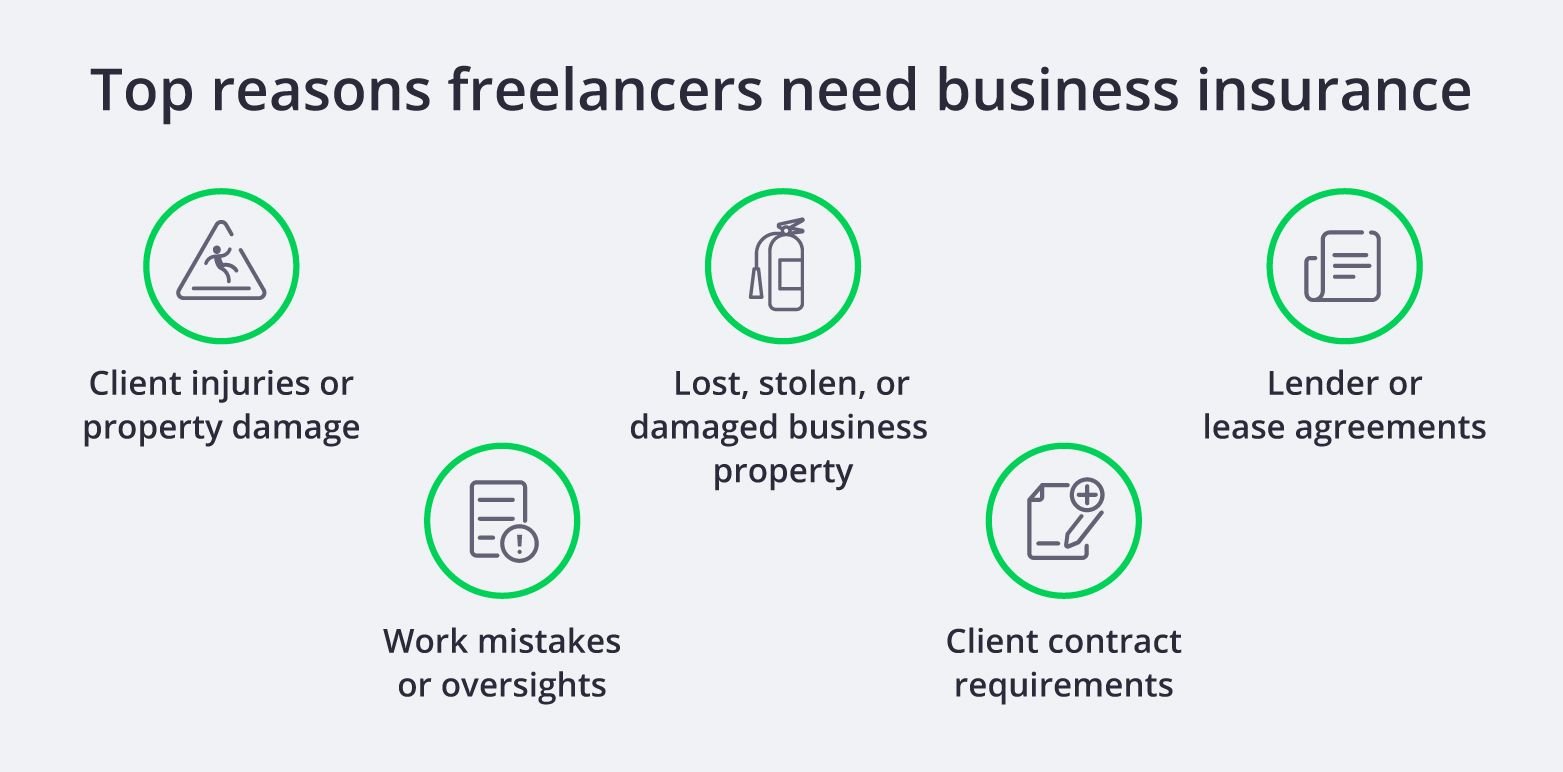
Why do freelancers need insurance?
Freelancers enjoy freedom and flexibility, but don't have an employer to protect them from a lawsuit. They also might have fewer assets to draw upon during an emergency. Business insurance gives you peace of mind and helps pay for costly legal fees, property repairs, and medical expenses.
What types of business insurance do freelancers need?
These insurance policies cover common risks faced by freelancers.
General liability insurance
General liability insurance covers the cost of third-party accidents, such as a client who trips and suffers a bodily injury at a freelancer's home office. It may be required for a commercial lease.
- Slip-and-fall accidents
- Accidents that damage client property
- Copyright infringement and other advertising injuries
Professional liability insurance
This freelance liability insurance covers legal costs when your mistake or oversight negatively affects a client. It's sometimes referred to as errors and omissions insurance (E&O).
- Mistakes that cause a client to lose money
- Missed deadlines
- Accusations of negligence
Workers’ compensation insurance
Workers’ compensation insurance shields freelancers from work-related medical bills that personal health coverage might deny.
- Work-related medical expenses
- Disability benefits
- Lost income
Cyber insurance
Cyber insurance helps freelancers recover financially from data breaches and cyberattacks. It's strongly recommended for any small business that stores personal information.
- Data breach notification costs
- Data breach investigations
- PR costs for reputational harm
Errors and omissions insurance
E&O insurance protects full-time and part-time freelancers from financial losses related to mistakes and oversights. It's sometimes referred to as professional liability insurance.
- Errors that cause a client to lose money
- Accusations of negligence
- Missed deadlines
Commercial auto insurance
This policy covers costs when a freelancer's business vehicle is involved in an accident. Each state has its own requirements for auto liability insurance.
- Auto accident injuries
- Property damage caused by your vehicle
- Vehicle theft and vandalism

How much does freelance business insurance cost?

Freelancers often qualify for discounts on business insurance. Factors that affect your premium include your profession, business location, and the policy's limits and deductible.
Here are the average costs for top insurance policies sold by Insureon:
General liability insurance: $42 per month
Professional liability: $61 per month
Workers' comp: $45 per month
Verified business insurance reviews
Hear from customers like you who purchased small business insurance.
State insurance requirements
Find business insurance requirements in your state

Get the right business insurance for gig workers and freelancers
[video: an animated header displays the Insureon logo. Underneath it, a subheading displays the text: "What insurance coverage do gig workers need?"]
MALE VOICEOVER: As a gig worker, you're able to set your own work hours fees and workspace. However you don't have an employer to protect you from lawsuits. With business insurance, you can safeguard your personal assets and your freelance business from costly repairs, legal fees, and medical expenses. Let's take a closer look at some of the top policies that can help protect your business.
[video: an illustrated header displays the text: "General liability covers:"]
[video: Under above header, three bullet points display the text: "Slip-and-fall accidents"; "Client property damage"; "Advertising lawsuits"]
General liability insurance covers third-party accidents, such as customer injuries or property damage that could happen at your home office. It also covers personal and advertising injury claims, such as libel or slander.
[video: an illustrated header displays the text: "Professional liability insurance covers:"]
[video: Under above header, three bullet points display the text: "Accusations of negligence"; "Missed deadlines"; "Errors that cost your clients money"]
Professional liability insurance, sometimes called errors and omissions coverage, will protect your business from lawsuits related to work mistakes and oversights.
[video: an illustrated header displays the text: "Workers' comp covers:"]
[video: Under above header, three bullet points display the text: "Work-related medical fees"; "Disability benefits"; "Lawsuits from employee injuries"]
Workers' compensation insurance is required in most states for businesses with employees, and can shield you from work-related medical costs your personal insurance may not cover.
[video: an illustrated header displays the text: "Cyber insurance covers:"]
[video: Under above header, three bullet points display the text: "Data breach notification costs"; "Data breach investigations"; "PR costs for reputational harm"]
Cyber insurance can help your business financially recover from data breaches, phishing, and other types of cyberattacks.
[video: an illustrated header displays the text: "Commercial auto covers:"]
[video: Under above header, three bullet points display the text: "Auto accident injuries"; "Property damage caused by vehicles"; "Vehicle theft and vandalism"]
Commercial auto insurance protects you from costs due to an accident involving your company vehicle. If you drive your personal vehicle for work, hired and non-owned auto insurance may be an alternative solution.
[video: an illustrated header displays the text: "Why is insurance important?"]
So, why is it important for you to have insurance as a gig worker?
[video: an illustrated header displays the text: "Insurance enables you to:"]
[video: Under above header, three bullet points display the text: "Sign contract & leases"; ""Comply with laws"; Apply for a loan";]
You may need coverage to sign a contract or lease. You also might need insurance to comply with federal, state, or local laws.
[video: an illustrated header displays the text: "Insurance enables you to:"]
[video: Under above header, three bullet points display the text: "Endure lawsuits & losses"; "Gain client trust"]
Insurance also protects you from catastrophic losses that could derail your business. Plus, the right coverage can help you gain a client's trust.
We make it easy for small business owners and freelancers to find the right, most affordable coverage.
Get free quotes for your small business with Insureon today.
[video: an illustrated white header displays the text: "Insureon is the #1 agency for small business insurance"]
Click the link to get started.
[video: an animated header displays the Insureon logo]
Common questions about business insurance for freelancers
Why is business insurance important for freelancers?
There are several important reasons for freelancers, independent contractors, sole proprietors, and other self-employed individuals to carry insurance:
You may need insurance coverage for contracts, loans, and leases. Clients, lenders, and landlords may require you to carry insurance to protect themselves against potential losses. In some cases, they may ask you to list them as an additional insured on your policy.
Some freelancer platforms require insurance. Marketplaces like Fiverr and Upwork sometimes require freelancer insurance before you can list your services. On Fiverr, you need sufficient general liability insurance to cover the most common risks for the type of service you offer. Upwork states that you need to "obtain any liability, health, workers' compensation, disability, unemployment, or other insurance needed, desired, or required by law."
You may need insurance to comply with the law. Even if your freelance business is just a side hustle, the laws in your state may require coverage for a business-owned vehicle, to obtain a license in your field, or to protect against work-related injuries.
You gain client trust by being insured. Even when it's not required, a certificate of insurance proves that your business can handle the cost of a lawsuit or accident. This helps attract clients and can give freelancers an edge over their competitors.
Insurance protects your business from catastrophic losses. Business insurance covers out-of-pocket costs from customer accidents, fires, and other incidents. Keep in mind that homeowner’s insurance and personal health insurance might not cover business-related claims.

How do I get a certificate of insurance?
With Insureon, you can get usually get a certificate of insurance on the same day that you apply for quotes. It’s a simple three-step process:
- Fill out our easy online application.
- Compare free quotes from top-rated insurance providers.
- Buy a policy and download a certificate of insurance.
A certificate of insurance will outline all your coverage options, such as policy limits, deductibles, and any endorsements. It serves as proof of insurance for clients, landlords, lenders, and anyone else who asks whether your business is insured.
How can I save money on business insurance?
Insurance is usually affordable for freelancers and small businesses in low-risk industries. There are a few ways to find cheaper insurance:
Compare quotes. With Insureon, you will instantly get multiple free online quotes from leading insurance companies. Compare insurance options from different providers and consult with our agents to make sure you're not paying too much for insurance while getting what's best for your freelance business.
Bundle policies. Many small business owners buy general liability coverage and commercial property insurance together in a business owner's policy, which costs less than purchasing each policy separately. It's sometimes possible to bundle other insurance options as well, depending on your profession.
Choose the right policy limits and payment plan. You can customize your insurance policy to save money, such as by choosing a higher deductible or lower policy limits. Pay the full annual premium if you can, as it often costs less than the monthly premiums.
Avoid claims. Finally, take steps to reduce your business's risks. Clear communication with clients can help you avoid lawsuits, which helps keep your premiums low.
Does my profession affect what type of insurance I need?
Yes, the type of gig and freelance work you do affects which insurance policies you need.
For example, the law in several states requires workers' comp coverage for construction contractors, even if they work alone, due to the high risk of injury. In some states, real estate agents and brokers are required to carry errors and omissions insurance. Plumbers and electricians may need a general liability insurance policy to obtain a license.
Your insurance should always match the risks of your profession. For example, freelance computer technicians and other tech professionals should invest in tech E&O to protect against specific cyber risks. A freelance writer might need media liability insurance to cover claims of libel or plagiarism.
Additionally, freelance makeup artists, freelance videographers, and other freelancers who travel with business products or equipment should consider inland marine insurance, which protects your business property wherever you take it.
You may need to do a little research to find out which type of coverage your business needs, or simply ask a licensed insurance agent.

























